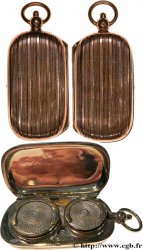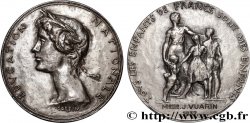fme_413274 - III REPUBLIC Médaille de visite de la Monnaie
недоступный.
Товар уже продан в нашем интернет-магазине (2017)
Цена: : 140.00 €
Товар уже продан в нашем интернет-магазине (2017)
Цена: : 140.00 €
Тип Médaille de visite de la Monnaie
Дата: 1889
Монетный двор / Город: 75 - Paris
Металл: copper
Диаметр: 42 mm
Ориентация осей монеты: 12 h.
Гравер LEONARD Laurent (1758-1774)
Вес: 34 g.
Век: lisse
Комментарии о состоянии
Très belle et intéressante médaille
Лицевая сторона
Аверс: легенда: AURO AGENTO AERI FLANDO FERIUNDO // AEDES AEDIFICATAE / MDCCLXX.
Аверс: описание: Vue de la Monnaie depuis la Seine.
Обратная сторона
Реверс: легенда: EXPOSITION UNIVERSELLE / 1889 / LES MEMBRES / DU / CONGRÈS MONÉTAIRE/ INTERNATIONAL / VISITENT LA MONNAIE S/ DE PARIS / 14 SEPTEMBRE .
Комментарий
En 1765, Jacques-Denis Antoine fut préféré aux architectes Étienne-Louis Boullée et François Dominique Barreau de Chefdeville pour la construction de ce nouveau bâtiment de style néoclassique. L'abbé Jean Delagrive propose de réaliser le projet sur les quais de la Seine, à l'emplacement de l'ancien hôtel de Conti, qui avait été racheté par la Ville de Paris pour construire un nouvel hôtel de ville. Un arrêt du Conseil retint définitivement ce site auquel Antoine adapta ses plans, un quadrilatère de 1 hectare composé de plusieurs cours. Le site n'était pas encore très bien desservi, mais l'emplacement était historique et les perspectives urbanistiques valorisantes.
La première pierre fut posée par l'abbé Terray le 30 avril 1771. La façade sur le quai, longue de 117 m, fut achevée en 1773 et le gros œuvre, ainsi que l'essentiel du décor, en 1775. Cet édifice, très admiré, valut à Antoine d'entrer en 1776 à l'Académie royale d'architecture. Certains critiquèrent toutefois la façade sur le quai, jugée d'une magnificence peu en accord avec le caractère d'une « manufacture »..
La première pierre fut posée par l'abbé Terray le 30 avril 1771. La façade sur le quai, longue de 117 m, fut achevée en 1773 et le gros œuvre, ainsi que l'essentiel du décor, en 1775. Cet édifice, très admiré, valut à Antoine d'entrer en 1776 à l'Académie royale d'architecture. Certains critiquèrent toutefois la façade sur le quai, jugée d'une magnificence peu en accord avec le caractère d'une « manufacture »..








 Cообщить об ошибке
Cообщить об ошибке Распечатать страницу
Распечатать страницу Отправить мой выбор
Отправить мой выбор Задать вопрос
Задать вопрос Consign / sell
Consign / sell
 Информация
Информация



